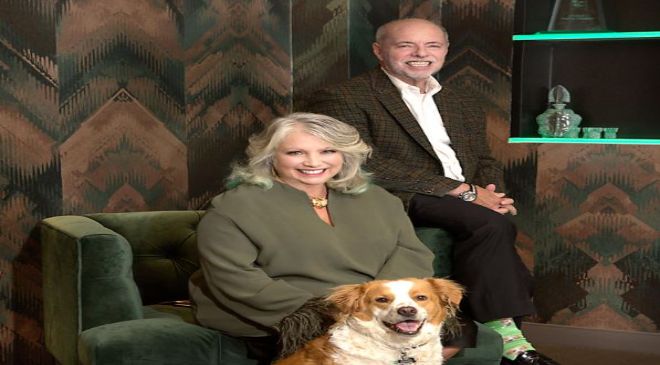DETROIT – If you go to work for Cindy Pasky, one of the city’s most influential business owners, one of the job requirements is slightly unusual.
You have to love animals. At work.
That’s right. Pasky, the founder, president and CEO of Strategic Staffing Solutions, which boasts 3,600 employees and has a presence in 46 states and 14 countries, is personally a pet lover. So is her husband, Paul Huxley, who serves as chairman of the staffing and consulting company, more commonly known as S3.
At the Detroit office, which takes up two floors in one of the city’s historic landmark buildings, each floor is home to three cats. It’s their permanent home, and they’ve lived there since Pasky adopted them as kittens from Michigan Humane, the state’s largest nonprofit animal welfare organization, where Pasky serves as chair of the executive committee.
At home, Pasky and Huxley have a few more cats and a dog, Dorney, who is a frequent visitor at S3 – and gets along famously with these feline friends.
A business case for Fido at the office
So why is this important to Pasky, beyond giving these cats a happy life?
It’s good for business, too.
Pasky is a pioneer in the integration of pets into work life, but it’s become much more of a trend around the country in recent years – especially following the pandemic, when many people adopted pets for the first time and feared leaving them home alone when they finally returned to the office.
A survey last year of 500 C-suite executives found that about 60% had plans to give employees more flexibility when it comes to their pets once they returned to the office.
Of 1,500 employees with pets surveyed, 57% said they’d be happiest returning to work if they could take their furry companion with them.
This is something that affects many Americans. Nearly 70% of U.S. households (85 million families) own a pet. At least 37 million millennials fall into this category.
Not only is pet ownership and consequently spending time with those pets important to today’s workforce, but employers also are realizing that the advantages of being pet-friendly – from creating a better work environment to attracting talent – is smart for business.
“The business case is simply, by and large, people love having animals around,” Huxley says. “It creates a happier work environment. It’s just a great thing.”
Office cats relieve stress, offer entertainment
While S3 staff don’t bring their pets in on a regular basis, if the doggy day care is closed or something else happens, it’s just fine for someone to bring their pet with them to work.
And at another one of S3’s offices, there’s one a day week when everyone can bring their pets to work.

In Detroit, the office cats help create a more homey atmosphere, among other benefits.
“They are the ultimate stress relievers,” Paksy says.
The cats are very intuitive, as animals usually are, and know which employee needs a little more attention on any given day.
Plus, they’re entertaining. One of the cats has figured out how to set off the light trigger that unlocks the office door, so if someone gets locked out, he can come to the rescue.
In many ways, the cats have become part of the office family, and employees like to bring in their kids or relatives to meet the cats. New toys will frequently show up for cats, and everyone chips in with their care.
Customers appreciate office culture
In addition to helping attract employees and boost office morale, the pet-friendly environment is often a selling point for clients, Pasky says.
“It’s becoming part of the selection criteria for people,” she says. “Our culture has distinguished us.”
Community engagement and a culture of charity are an essential part of Pasky’s vision for her company. Michigan Humane is far from the only organization that Pasky is involved with, but it’s an excellent example of how she’s driven to make her hometown of Detroit a better place to live.
When people have pets in their lives, studies have shown they are happier and healthier. Their communities and workplaces usually are, too.
Pets make us happier, healthier
Matt Pepper, president and CEO of Michigan Humane and board chair of the Association for Animal Welfare Advancement, says if you have a pet, you are more likely to be active and less likely to die of a heart attack or stroke. Just petting an animal can reduce blood pressure.
“People love having experiences with their pets, and they love what their pets mean to them,” Pepper says. “If you want to be able to attract and retain young talent, you’ve got to include pets in your master plan for your city. You’ve got to have park space, you’ve got to have businesses that are supportive. You’ve got to have work environments that are supportive of people with their pets.”
Pasky has found this to be true at S3, where she says her company’s pet-friendly philosophy has made it competitive when recruiting.
And for those employees who start without a pet at home, that changes pretty quickly.
That’s good news for all the cats and dogs who are eagerly awaiting adoption, in Detroit and elsewhere.







































